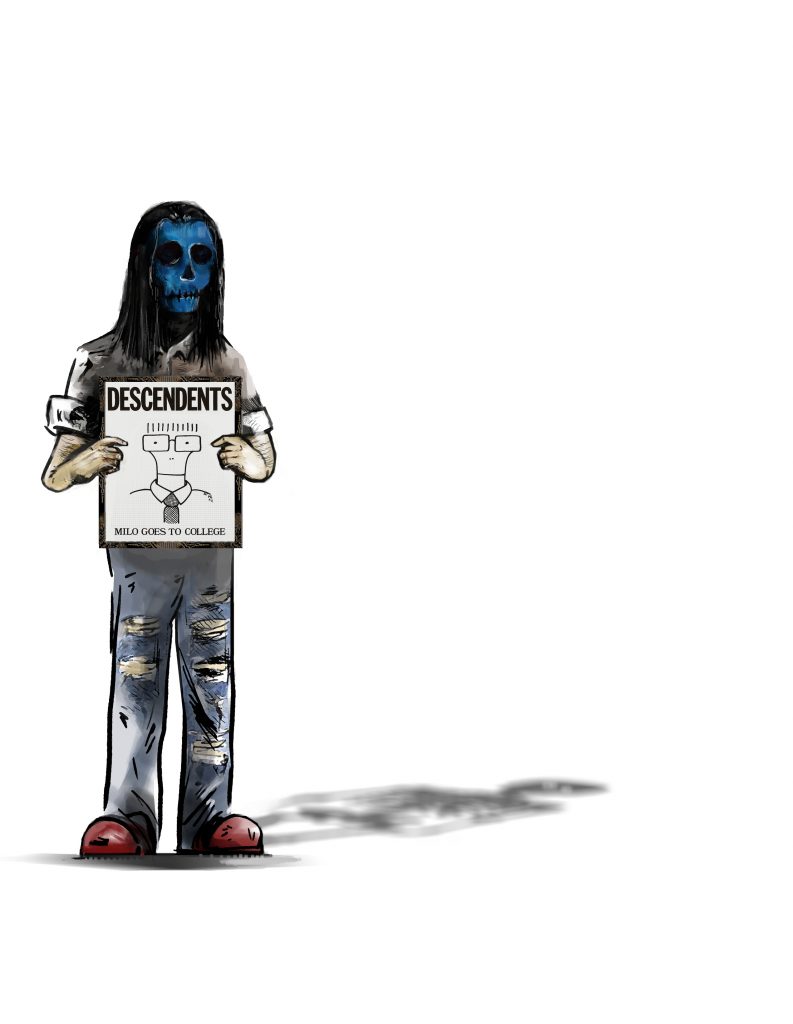Milo Aukerman from the Descendents
Growing up in Texas, I heard all kinds of absolutes.
“You must absolutely believe in Jesus or you are bad.”
“White people are absolutely better than all the other races.”
“You must absolutely go to school and get good grades so that you can get a good job.”
….and the one that I might actually hate the most…
“You must absolutely watch football and be a tough guy in order to be a man.”
I haven’t found any of the above to be absolutely true. And as I’ve grown older I realize that there are very few absolutes in the world. Life, near as I can tell, is an amazing and endless shade of greys and a kaleidoscope of colors so vivid that they defy explanation. I’m not sure absolutes even exist. Perhaps as a scientist, Milo can explain if they do, but from a philosophical perspective, not so much.
I am, however, absolutely sure about this: I’m happy that a guy like Milo exists. I don’t know if he did it intentionally, but he set out against the grain and succeeded. In the face of absolutes, he dodged.
This blog was started because of guys like him. His life gives me hope because I’m tired of seeing the rise of horrible people who often force absolutes upon others. There is just too much garbage in the news for me to ingest and stay sane. Why every ass-hat screaming “Pay attention to me!” gets that attention is beyond what my little brain can comprehend.
It makes me want to scream!
So it’s nice to know that a person doesn’t have to be horrible to get ahead or have to blindly accept what the world might deem them to be.
This little rant brings us to the Descendents.
Milo is not only the singer in the band, he also has a doctorate in biology. I heard a story about how he joined the Descendents. Rumor has it that he was a big fan and often went to their rehearsals. One day they let him sing, because he said that he could. Well done, sir.
To look at him, he doesn’t strike you as a guy that would be successful at two drastically opposing careers, but he is. And that’s pretty cool. I don’t know him personally, but I wish that I did. Of the many blogs I’ve written so far, he’s given two of my favorite answers. I won’t tell you what they are. I’m sure you’ll find them on your own.
Researching him, I ran across a quote at asbmb.org by Goodpizzapie in the comments section after an interview written by Geoffrey Hunt and Rajendrani Mukhopadhyay. The quote sums things up pretty well: “The Descendents demonstrated the importance of critical thought, healthy (but not aggressive) skepticism of positional authority, pride in individualism, and making the right choice in the face of peer and social pressure.”
Absolutely rad!
Without further ado, Milo Aukerman…
 Q: What is your favorite sandwich and who makes the best one?
Q: What is your favorite sandwich and who makes the best one?
M.A. Capriotti’s Turkey Sub…I’ve gotten that one dozens of times. With hot peppers – that’s the key to it all.
Q: What is your favorite meal your mom makes?
M.A. Chicken pot pie (but she just pulls Banquet out of the freezer)
Q: How did you meet your best friend?
M.A. Bill Stevenson was a high school classmate of mine. We didn’t really hang out until one day at school Bill sold me the first Descendents single (Ride the Wild/It’s a Hectic World). Once I heard it, I became their number one fan. Shortly after that I joined the band, and our friendship blossomed because it was clear we had the same passion for music.
Q: When or how did you find what you wanted to do?
M.A. Two-part question for me. Science: I gave a presentation in high school about DNA, and that got me excited about research in biology, which I then pursued in college and graduate school. Music: I started going to punk rock shows in 1980, then joined the Descendents, and figured I’d see where that would go for a while.
Q: How did you pursue it?
M.A. Science: went to college, then grad school, then post doctoral research, then got a job at DuPont.
Music: joined the Descendents
Q: Did you have a mentor/mentors in pursuing it. Who were they and what did they do for you?
M.A. Science: My grad school advisor, Bob Schmidt, taught me how to do good science and nurtured my enthusiasm for research.
Music: Bill Stevenson, he’s pretty much been the giant on whose shoulders I have stood.
Q: What do you dream of doing or are you doing it? If so, then what is the goal?
M.A. Like most musicians I dream of writing the perfect song…but it’s like what we say about achieving ALL, you can never really get there, but you’ve got to try.
Q: What would your 15-year-old self say to you now?
M.A. Dude, you’ll never be as good as the Ramones, give it up!
Q: If life were a person what would you say?
M.A. Have you considered Xanax? Ritalin, maybe?
Q: If you were in charge of the world and you have no restrictions, real or imagined, what is the one thing you would give it?
M.A. Peace
Q: Has morality disintegrated to the point that we now need Yelp for people?
M.A. I don’t think a crowd-sourced reviewing site for people would work because people have such different notions of what’s moral. There would be negative reviews about pro-choice people, and likewise negative reviews about anti-choice people, for example. It would just increase the rancor in the social media environment, which we DO NOT NEED. If people would just do this one thing – love and respect your fellow man – we could do away with all moral ambiguity.
Q: How is society getting things right?
M.A. Getting information to people. However, the new challenge is making sure information is factual, and the recent U.S. election is a perfect example of this. Now that people have become so savvy about accessing information online, there needs to be a new focus on vetting news stories and determining trustworthy sites for acquiring information.
Q: What do people need in order to see each other as equals?
M.A. See above, morality question. Above ALL else, love and respect your fellow man. (sorry,… person). Everyone has something to offer to society, and we should value everyone for that potential.
Q: Do we still need religion?
M.A. Again, the only important lesson from religion is LARYFM (now it’s an acronym!). If people need religion to have that drilled into their skulls, then it’s valuable. The problem is that one message is obscured by all the other B.S. that people interpret as allowing them to hate others (see our song “Shameless Halo”).
Q: Do you have hope for the future?
M.A. I do. And that’s even after a US election that brought out an ugliness in America, one that we should have eradicated years ago. But there are plenty of people ready to stand up and fight for the rights of all civilians, so I’m hoping America can rise up out of the muck in the upcoming years.
Q: Hot topic of the week: This is an open discussion. Could be Gay marriage or Confederate flag, Donald Trump, for example.
M.A. Well, it’s Trump, as you might expect. See above question.
Q: What are three things that work for you: For example, I can’t find a good razor. Because of a near unbridled need for massive profits I find that many products don’t live up their advertising. What works for you?
M.A. My automatic espresso machine
My in-ears earphones and wireless pack (for live music monitoring)
My ten-year-old iPod nano
More thought-provoking questions:
1: Do Americans have the right to complain about immigration?
M.A. They have the right due to the First Amendment, but I don’t think they should complain. Immigration is a cornerstone of the great American experiment and should be welcomed.
2: If our value system is based on scarcity then what of a human life, now that the population is in the billions?
M.A. Combating the reality of scarcity ought to be focused on maintaining the dignity of human life for everyone. When a population suffers due to war/poverty/famine, etc., we all suffer as members of the human race. Bad Chi/Karma or whatever you want to call it.
3: Would life be easier if racism were accurate? (This is a question to get you thinking about racism. Often ideas of race are talked about as an absolute truth.)
M.A. We already live in a society where an alarming number of people believe this (i.e. racial stereotypes are true characterizations), and it hasn’t brought anything but hatred and misery. So, no.
4: What would you like to see written about you on your gravestone?
M.A. Discoverer of microRNA function in plants; a good father and husband who wrote a few good songs.
Interview link: http://www.asbmb.org/asbmbtoday/201409/features/aukerman/






